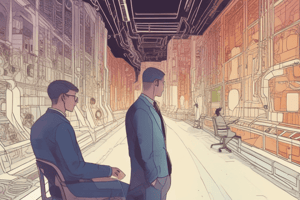Podcast
Questions and Answers
What is the primary function of Random Access Memory (RAM)?
What is the primary function of Random Access Memory (RAM)?
- To store permanent operating system files
- To provide firmware updates and instructions
- To retain data even when the computer is turned off
- To hold temporary data for currently running programs (correct)
Which of the following accurately describes Read-Only Memory (ROM)?
Which of the following accurately describes Read-Only Memory (ROM)?
- It retains its contents even without power and stores firmware (correct)
- It is used primarily for temporary data storage
- It can be easily overwritten with new data
- It is volatile and loses data when the computer is powered off
What distinguishes a Solid-State Drive (SSD) from a Hard Disk Drive (HDD)?
What distinguishes a Solid-State Drive (SSD) from a Hard Disk Drive (HDD)?
- SSDs use flash memory for persistent data storage (correct)
- SSDs use mechanical parts to store data
- SSDs typically have slower data access times compared to HDDs
- HDDs store data using integrated circuit assemblies
What is a characteristic of optical drives?
What is a characteristic of optical drives?
Which statement best describes secondary memory?
Which statement best describes secondary memory?
Which interface is primarily characterized by the use of Windows, Icons, Mice, and Pointer?
Which interface is primarily characterized by the use of Windows, Icons, Mice, and Pointer?
What functionality does a spreadsheet offer that maintains data integrity?
What functionality does a spreadsheet offer that maintains data integrity?
Which interface is commonly used in ATMs to minimize typing requirements?
Which interface is commonly used in ATMs to minimize typing requirements?
What does the concept of light and occlusion contribute to in three-dimensional interfaces?
What does the concept of light and occlusion contribute to in three-dimensional interfaces?
Which application was the first recognized spreadsheet software?
Which application was the first recognized spreadsheet software?
Who first created the Muller-Lyer illusion?
Who first created the Muller-Lyer illusion?
What is the primary function of sensory memory?
What is the primary function of sensory memory?
Which type of memory is often referred to as 'working memory'?
Which type of memory is often referred to as 'working memory'?
What kind of memory exists for visual stimuli?
What kind of memory exists for visual stimuli?
How long can information be stored in short-term memory?
How long can information be stored in short-term memory?
Which of the following does NOT describe long-term memory?
Which of the following does NOT describe long-term memory?
Which is NOT a type of sensory memory?
Which is NOT a type of sensory memory?
What is the primary function of rehearsal in memory?
What is the primary function of rehearsal in memory?
Which interface type is particularly suitable for expert users and involves direct expressions of instructions?
Which interface type is particularly suitable for expert users and involves direct expressions of instructions?
What major development in human-computer interaction occurred in the 1990s?
What major development in human-computer interaction occurred in the 1990s?
Which interface relies heavily on recognition rather than recall and features hierarchically grouped options?
Which interface relies heavily on recognition rather than recall and features hierarchically grouped options?
What is a significant problem associated with Natural Language Interfaces?
What is a significant problem associated with Natural Language Interfaces?
What type of interface guides users through a series of questions and is often suited for novices?
What type of interface guides users through a series of questions and is often suited for novices?
What is the primary source of information for the average person?
What is the primary source of information for the average person?
Which of the following is a characteristic feature of a Command Line Interface?
Which of the following is a characteristic feature of a Command Line Interface?
Which interface is used primarily for data entry or retrieval and resembles a paper form?
Which interface is used primarily for data entry or retrieval and resembles a paper form?
Which sense is often underestimated in importance compared to vision?
Which sense is often underestimated in importance compared to vision?
What does the human information processing system refer to?
What does the human information processing system refer to?
What is necessary to effectively use query languages like SQL in Query Interfaces?
What is necessary to effectively use query languages like SQL in Query Interfaces?
What optical illusion demonstrates that the human mind judges an object's size based on its background?
What optical illusion demonstrates that the human mind judges an object's size based on its background?
What was the main focus of the section discussing human input-output channels?
What was the main focus of the section discussing human input-output channels?
Which of these senses is not mentioned as a primary input in the context of human-computer interaction?
Which of these senses is not mentioned as a primary input in the context of human-computer interaction?
Who first demonstrated the Ponzo illusion?
Who first demonstrated the Ponzo illusion?
What cognitive aspect is closely associated with the limitations in human information processing?
What cognitive aspect is closely associated with the limitations in human information processing?
Flashcards are hidden until you start studying
Study Notes
Human-Computer Interaction (HCI)
- HCI involves an interactive process where user input becomes computer output and vice versa.
- Human cognition limits the ability to process information, influencing interaction design.
- Human Information Processing is often termed cognition, which is foundational in HCI frameworks.
Input-Output Channels
- Vision is the primary source of information for humans but has physical and perceptual limitations.
- Hearing, often considered secondary, significantly contributes to our interaction with technology.
- Touch or haptic perception is a critical input channel that affects user interaction with computers.
- Movement and motor control influence how users interact with technology.
Optical Illusions
- Ponzo Illusion: Demonstrated by Mario Ponzo, shows that background context affects size perception. Two identical lines across converging lines appear different in size.
- Muller-Lyer Illusion: Created by Franz Carl Muller-Lyer, where identical lines appear unequal due to depth cues provided by arrow-like fins at line ends.
Human Memory Types
- Sensory Memory: Buffers for initial stimuli from the senses; includes iconic, echoic, and haptic memory.
- Short-term Memory (Working Memory): Temporary storage for information retrieval, functioning as a scratch pad for rapid recall.
- Long-term Memory: Permanent storage for knowledge, actions, and experiences; it encompasses factual, procedural, and experiential knowledge.
Computer Memory Types
- Primary Memory: Composed of RAM, providing short-term data storage for active processes.
- ROM (Read-Only Memory): Stores permanent data like firmware; non-volatile and retains information post shutdown.
- HDD (Hard Disk Drive): Magnetic storage for data within the computer.
- SSD (Solid-State Drive): Uses flash memory for persistent data storage.
Interaction Models
- Help clarify actions between users and systems by translating user intentions into system responses.
- Interaction paradigms evolved from batch processing in the 1950s to contemporary models involving human-robot interaction.
Types of User Interfaces
- Command Line Interface: Direct user instructions via keystrokes, suitable for experts and repetitive tasks.
- Menu Interface: Offers options on-screen, facilitating ease of use through recognition rather than recall.
- Natural Language Interface: Employs speech recognition or typed inputs but may face challenges with comprehension.
- Query Interface: Guides users through Q&A interactions; often seen in simpler information systems.
- Form-Fill Interface: Simplifies data entry via structured forms, requiring good design for usability.
- Spreadsheet Interface: Evolved from early tools like VisiCalc to modern applications like MS Excel, enabling complex data manipulation.
- WIMP Interface: Predominant interface style based on Windows, Icons, Mice, and Pointer, common in desktop environments.
- Point and Click Interface: Minimal typing, used in multimedia frameworks and ATMs for intuitive navigation.
- Three-Dimensional Interfaces: Utilize virtual reality and 3D workspaces to provide depth and an immersive user experience.
Studying That Suits You
Use AI to generate personalized quizzes and flashcards to suit your learning preferences.




